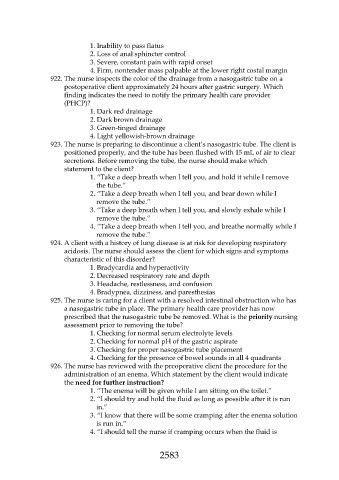Page 2583 - Saunders Comprehensive Review For NCLEX-RN
P. 2583
1. Inability to pass flatus
2. Loss of anal sphincter control
3. Severe, constant pain with rapid onset
4. Firm, nontender mass palpable at the lower right costal margin
922. The nurse inspects the color of the drainage from a nasogastric tube on a
postoperative client approximately 24 hours after gastric surgery. Which
finding indicates the need to notify the primary health care provider
(PHCP)?
1. Dark red drainage
2. Dark brown drainage
3. Green-tinged drainage
4. Light yellowish-brown drainage
923. The nurse is preparing to discontinue a client’s nasogastric tube. The client is
positioned properly, and the tube has been flushed with 15 mL of air to clear
secretions. Before removing the tube, the nurse should make which
statement to the client?
1. “Take a deep breath when I tell you, and hold it while I remove
the tube.”
2. “Take a deep breath when I tell you, and bear down while I
remove the tube.”
3. “Take a deep breath when I tell you, and slowly exhale while I
remove the tube.”
4. “Take a deep breath when I tell you, and breathe normally while I
remove the tube.”
924. A client with a history of lung disease is at risk for developing respiratory
acidosis. The nurse should assess the client for which signs and symptoms
characteristic of this disorder?
1. Bradycardia and hyperactivity
2. Decreased respiratory rate and depth
3. Headache, restlessness, and confusion
4. Bradypnea, dizziness, and paresthesias
925. The nurse is caring for a client with a resolved intestinal obstruction who has
a nasogastric tube in place. The primary health care provider has now
prescribed that the nasogastric tube be removed. What is the priority nursing
assessment prior to removing the tube?
1. Checking for normal serum electrolyte levels
2. Checking for normal pH of the gastric aspirate
3. Checking for proper nasogastric tube placement
4. Checking for the presence of bowel sounds in all 4 quadrants
926. The nurse has reviewed with the preoperative client the procedure for the
administration of an enema. Which statement by the client would indicate
the need for further instruction?
1. “The enema will be given while I am sitting on the toilet.”
2. “I should try and hold the fluid as long as possible after it is run
in.”
3. “I know that there will be some cramping after the enema solution
is run in.”
4. “I should tell the nurse if cramping occurs when the fluid is
2583

